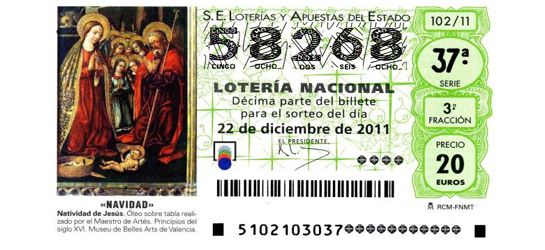The Loneliest Number

In 1812, Spain instituted something called the Sorteo Extraordinario de Navidad, or the Spanish Christmas Lottery. Just over two hundred years later, the Spanish Christmas Lottery still runs annually, making it one of the longest continuing running lotteries in the world. It features a grand prize called El Gordo, literally “the fat one,” which can reach mind-boggling amounts. In 2012, for example, El Gordo, collectively, was worth over 720 million Euro, or about $1 billion USD. But El Gordo, both officially and informally, isn’t awarded as one prize. Because of its history and growth as well as the often prohibitive price of a Christmas Lottery ticket, large groups often share El Gordo. In 2011, for example, seventy households in the tiny village of Sodeto shared a roughly 110 million Euro (about $150 million USD) prize. Unfortunately, Sodeto at the time had seventy-one households.
The one guy who lived in that home was the only person in town who hadn’t bought into the shared ticket.
Historically, the Sorteo Extraordinario de Navidad was designed to have only 100,000 lots issued, numbered 00000 to 99999. But over time, the game became incredibly popular, warranting the issuance of many more tickets. In order to keep the traditional five-digit ticket numbers, lottery officials split the prize into (now) 180 different pools called “series.” The entire prize pool — consisting of 70% of the lottery’s total receipts — is divided equally into each of these series. El Gordo is similarly divided into 180 equal parts.
Each of the 10,000 tickets in a series is called a billete, and each billete costs 200 Euro (about $260 USD), a prohibitive amount for many. So the lottery has subdivided billetes into ten equal fractions called decimos. Decimos are often sold by local community organizations as a way to raise funds for those organizations; lottery officials allow these groups to keep a small percentage of the sale. In 2011, Sodeto’s homemakers’ association went door-to-door in town, selling about 250 decimos (all bearing the number 58268, collectively making up 100 different series) bringing in roughly 1,000 Euro ($1,300 USD) for local events, according to the New York Times.
One such decimo is seen above, and cost the purchaser 20 Euro (or about $26 USD). It’s a winner, too — El Gordo came up 58268 that year — and it’s worth about 400,000 Euro ($520,000 USD) to the bearer. Some of the decimos were split up even further into what the Times calls “participations” (it’s silent to what the Spanish word is), and virtually everyone in the town of Sodeto had at least one participation. In fact, with so many decimos (or fractions thereof) held by the 250 or so people in that small farming village, nearly everyone in town had at least a six-figure windfall, and many were overnight millionaires.
Nearly everyone, because of a lone exception: a Greek filmmaker named Costis Mitsokakis, who moved to the town years earlier “for love of a woman,” in the words of the Times. (The Times further notes that “it did not work out” with his love interest.) Mitsokakis resided in a barn in town, and, as TIME reported, the ladies of the homemakers association accidentally skipped his home when making the rounds, leaving Mitsokakis out of the prize pool. He took the omission shockingly well, saying that while it’d have been nice to win, it wasn’t all that big of a deal. (A later GQ profile of the town would note that Mitsokakis, pre-lottery, had a reputation for spending most of his time growing marijuana and sunbathing nude instead of working, so perhaps this isn’t all that surprising in retrospect.) Besides, he noted, he would likely come out ahead in the end: he was trying to sell some land for years, and now, his neighbors could probably afford to buy it.
Bonus Fact: In June of 2012, someone purchased a lottery ticket at a kiosk in the Spanish city of La Coruna — a winning one entitling its owner to a $6.3 million USD prize. A man named Manuel Reija, a cashier at another kiosk, turned in the winning ticket a few weeks later. But he didn’t turn it into lottery officials in order to claim the prize, which he almost certainly could have. Reija found the ticket lying around the counter weeks after the drawing and, even though he knew that it was worth millions, turned it over in hopes that the true owner could be identified. As of September 2013, that person hasn’t been found, and originally, the prize will go to Reija had the true winner not been identified by June of 2014. However, as of late 2015, the matter is still tied up in court.
From the Archives: Beating the Odds: The history of one very beatable lottery.
Related: A set of six fake lottery tickets, each one a “winner.”
